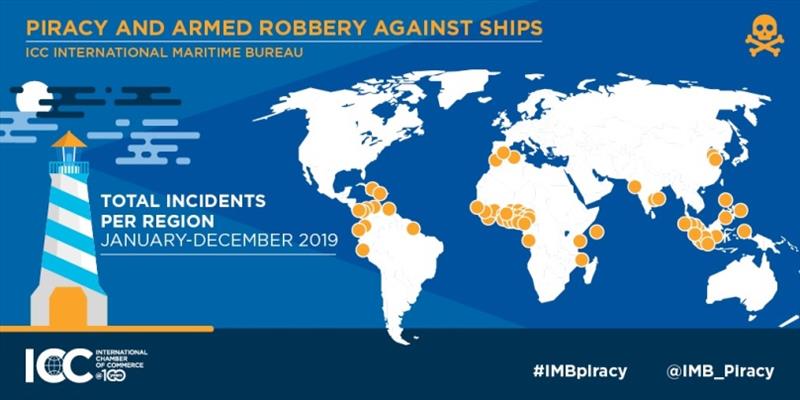ForumIAS announcing GS Foundation Program for UPSC CSE 2025-26 from 19 April. Click Here for more information.
ForumIAS Answer Writing Focus Group (AWFG) for Mains 2024 commencing from 24th June 2024. The Entrance Test for the program will be held on 28th April 2024 at 9 AM. To know more about the program visit: https://forumias.com/blog/awfg2024
Recently, marine commandos (MARCOS) of the Indian Navy thwarted a hijacking attempt in the North Arabian Sea. They managed to secure and safely evacuate the 21 crew members, including 15 Indians, from the merchant vessel Lila Norfolk.
This incident has brought to attention the issue of Piracy in Arabian Sea.

What are the reasons behind piracy in Arabian Sea?
Piracy in the Arabian Sea has been a longstanding issue due to the below-mentioned causes-
1. Geopolitical Instability- Political instability and conflict in East African countries like Somalia have contributed to the rise in piracy.
2. Economic Distress and Destruction of livelihoods – Widespread poverty and lack of economic opportunities in countries like Somalia, Yemen have drawn them towards piracy. For ex- The destruction of the livelihoods of the local fishing communities.
3. Maritime Vulnerabilities- There is inadequacy of maritime security in the vast expanse of the Arabian Sea. This makes the global cargo ships prone to maritime piracy.
4. Means of terrorism financing- The fundamentalist and radical groups use the piracy route to extract heavy ransom for financing their group’s activities. For ex- Houthi rebels of Yemen.
What are the implications of piracy in Arabian Sea?
1. Global Trade Disruptions- The waters of the Indian Ocean carry 80% of the world’s oil. Increased piracy in the Arabian Sea affects crucial trade routes and severely impacts the global economy.
2. Endangers Energy Security- Disruptions due to piracy in the Rea Sea and Arabian route pose significant energy security risks for Asian economies like India, as it is a key route for oil and gas shipments.
3. Rise in geopolitical Tensions- The involvement of multiple nations like U.S., China, Iran and Saudi Arabia for countering piracy has also led to increased geopolitical contestations amongst them. For ex- China’s base in Djibouti, Port of Doraleh, has seen increased Chinese militarisation in the name of piracy protection.
What are the challenges in dealing with piracy in Arabian Sea?
1. Geographical Expanse- Pirates take advantage of the geographical expanse and vastness of the Arabian Sea to target the shipping routes.
2. Weak Governance and Political Instability- Lack of political stability in countries like Somalia and Yemen have hindered their diplomatic engagements. Thus, no joint naval and military exercises with these countries takes place in the Arabian Sea region.
3. Lack of International cooperation- The UNCLOS mechanism remains defunct due to lack of effective cooperation amongst the major global powers. USA, Germany and Great Britain have refused to sign the UNCLOS 1982 agreement, leaving a huge void in the establishment of a rule based order in the international waters.
4. Legal Challenges- The prosecution of pirates is challenging due to different jurisprudence mechanism in different countries of the world.
5. Lack of resources and information sharing Mechanism- Nations like Djibouti, Somalia, Yemen lack naval assets, technology, and personnel to effectively patrol and secure their waters against piracy.
What are the International and National Initiatives to control piracy in the Arabian Sea?
Global Initiatives Related to Maritime Piracy
| United Nations Convention on the Law of the Sea (UNCLOS) | It establishes the legal framework for combating piracy, as outlined in. The UN Security Council and General Assembly have consistently emphasized on the application of UNCLOS in combating maritime threats. |
| Operation Prosperity Guardian | The United States has initiated Operation Prosperity Guardian, a multinational security initiative to ensure security in the Red Sea. |
| Convention for the Suppression of Unlawful Acts against the safety of Maritime Navigation (1988) | It is a multilateral treaty. The main purpose of the treaty is to ensure that appropriate action is taken against people who commit unlawful acts against ships. It was adopted in 1988 at the Suppression of Unlawful Acts(SUA) Convention in Rome. |
| Combined Maritime Forces (CMF) | The CMF is a multinational naval partnership with primary focus areas aimed at defeating terrorism, preventing piracy, fostering regional cooperation, and promoting a secure maritime environment. CMF has 39 member nations including India. |
India’s Initiatives Related to Maritime Piracy
1. SAGAR policy.
2. India has reiterated its support for the UN Convention on Law of Sea (UNCLOS).
3. International Fusion Centre (IFC).
4. Indian Ocean Rim Association (IORA).
What should be the way ahead to counter piracy in Arabian Sea?
Controlling piracy in the Arabian Sea involves a multifaceted approach. Some of them are mentioned below
1. Enhanced Naval Patrols- Increased naval presence and patrols by both national and international maritime forces help deter pirate activities. India must increase its frequency of joint naval exercises with Saudi Arabia, UAE.
2. Collaborative Efforts- Collaborative task forces, such as the Combined Task Force 150 (CTF-150), must be effectively used to counter the piracy threats in the region and secure strategic points like the Bab al-Mandab Strait.
3. Enhanced Naval Protection- Countries must bolster their naval presence to safeguard commercial shipping. For ex- India’s Operation Sankalp, which began in 2019 to escort India-flagged ships, must be replicated by other countries as well.
4. Establishing back channel talks with Non-State Actors- Countries must open a channel of communication with Non-state actors like Houthis, who are involved in piracy to fund their wars.
5. Capacity building- Capability building approach must be adopted in countries like Somalia and Yemen to address the root causes of poverty and livelihoods of local population and reduce their dependence on ‘piracy as a means to livelihood‘.
Combating piracy in the Arabian Sea is a complex and ongoing challenge that necessitates a comprehensive and coordinated approach involving multiple stakeholders at regional and international levels.




